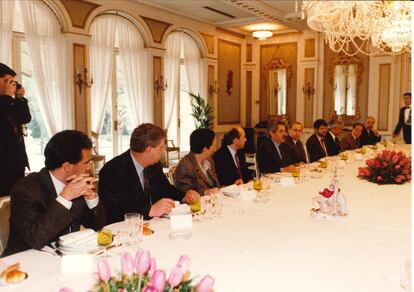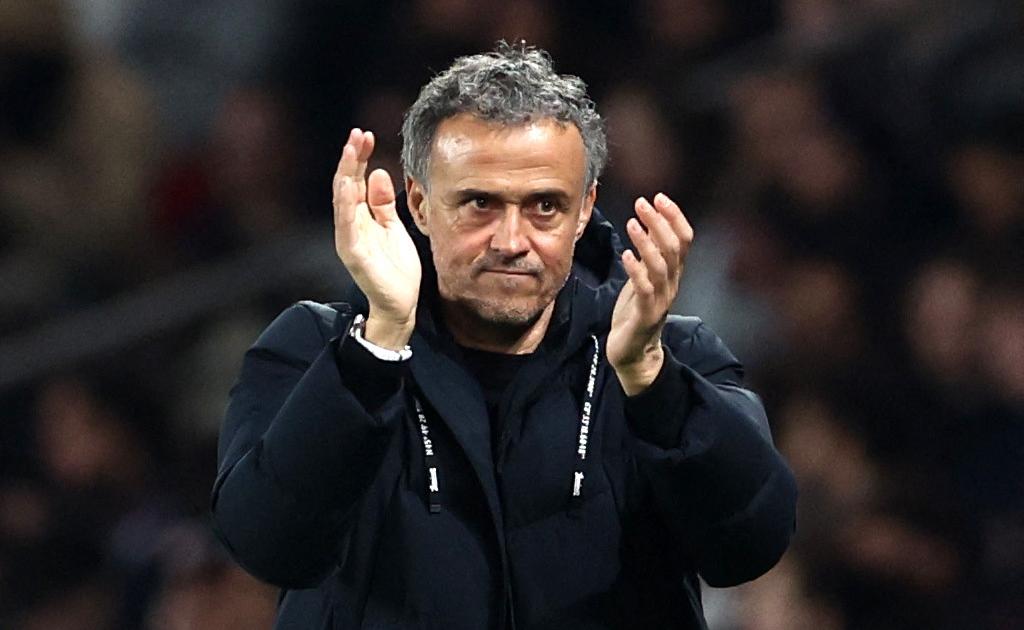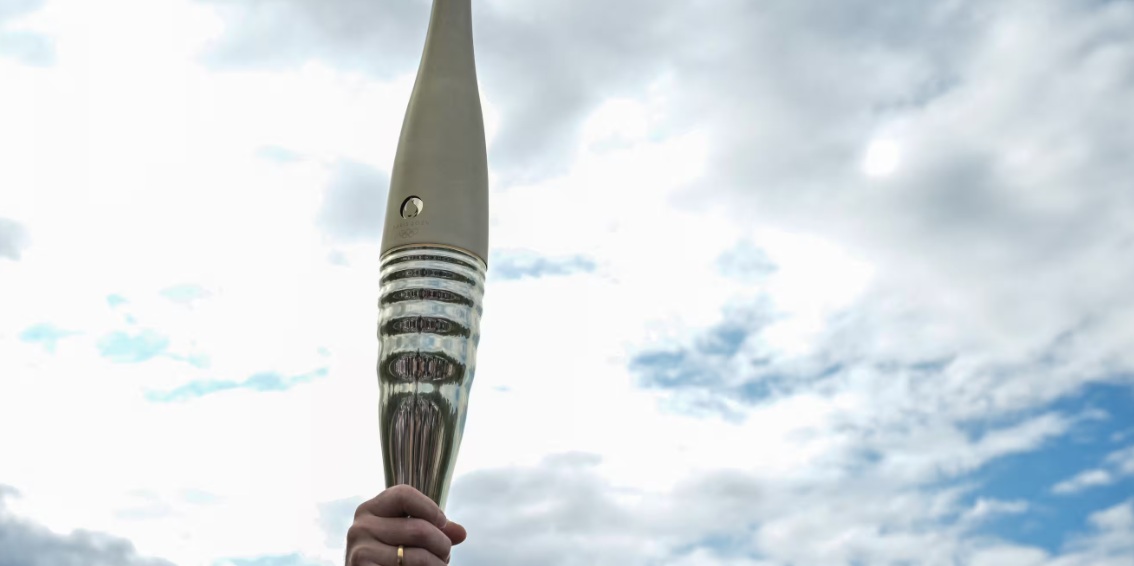His world had fallen apart and everything was to be done.
The Soviet Union had disintegrated and Russia was looking for capitalists abroad to raise the knocked-out giant.
The call from Olympic Barcelona to its sister city, Saint Petersburg, could not be missed.
It was February 1992 and Anatoli Sobchak, the first mayor of the capital of the czars elected at the polls, landed in Barcelona with an intense agenda to attract investment.
The current president of Russia, Vladimir Putin, was part of the delegation.
More information
Last minute of the war in Ukraine
An article last March in
La Vanguardia
rediscovered Putin's time in Barcelona.
The City Council has made public the images of a lunch at the Palacete Albéniz presided over by the then mayor Pasqual Maragall.
Across the table from him sat Sobchak, and next to him, Putin.
Other media added details of the week the Russian delegation spent in the city.
Nació Digital
retrieved images of a dinner at the Cercle d'Economia.
The testimonies of the time indicate that Putin was a secondary character in the Petersburg delegation, a kind of secretary to the charismatic Sobchak.
Nothing is further from reality.
“Putin was at that time the person to meet in St. Petersburg,” academic Karen Dawisha wrote in 2014 in
Putin's Kleptocracy,
a reference book to understand the beginnings of the Russian autocrat.
Putin was responsible since 1991 for the international relations of Russia's second city.
In his office, a gloomy and simple room, with an ashtray and a table as the only furniture, foreign capital operations in Saint Petersburg were authorized, according to the investigation of the journalist Masha Gessen in the book
The Man Without a Face
.
What happened in those operations in the 1990s, as Putin conceded in an official biography from the year 2000, was not exactly exemplary: "It was a time full of shady deals, pyramidal financial schemes and the like."
When Putin was touring Barcelona in February 1992, he was already suspected of having profited from programs to exchange raw materials for food from abroad.
His scourge was the deputy from St. Petersburg Marina Salye.
She this she headed an investigation commission that in May 1992 concluded that the City Council's head of foreign relations had authorized at least twelve fraudulent contracts valued at nearly 100 million dollars —94 million euros—.
Russia needed food for its population because the agricultural industry had been blown up.
The ruble was worth nothing and there was no money to buy food.
The solution that the authorities arrived at was the exchange of raw materials for food.
Salye's documents show that Putin authorized at least twelve operations for the sale of raw materials at bargain prices with instrumental companies that later disappeared, one part in exchange for foreign currency and the other in exchange for food.
The total amount of the commissions stipulated in the contracts exceeded 32 million euros.
The food never reached St. Petersburg.
Putin admitted the scam but blamed it on the businessmen with whom he had negotiated.
In 1991, he himself had led the negotiation of an exchange program for German meat valued at more than 90 million marks —46 million euros—.
The meat also did not reach Russia.
Putin landed in Barcelona on February 25, 1992, a month before Salye presented the commission's conclusions to Yuri Boldirev, who headed what would be the Court of Auditors in the Government of President Boris Yeltsin.
Boldirev concluded that Putin had committed multiple crimes, but no action was taken against him because neither Yeltsin nor Sobchak wanted it.
"It was a typical case at that time," Boldirev explained in Gessen's book, to play down the issue.
Barcelona has been twinned with Saint Petersburg since 1985, when the Soviet Union still existed and it was called Leningrad.
Seven years later, the Saint Petersburg delegation was received by the City Council and at the Palau de la Generalitat, the seat of the Catalan Government;
its members appeared at the Cercle d'Economia and gave a conference at the Bar Association to detail the benefits of investing in Russia.
Mayor Sobchak also signed an oil-for-food agreement valued at 47,000 million pesetas —283 million euros— with Juspi, a company created between Enric Bernat, founder of Chupa Chups, and Lluís Prenafeta, who was Jordi Pujol's right-hand man as first secretary of the presidency of the Generalitat.
Vladimir Putin, together with Pasqual Maragall, during his visit to Barcelona in February 1992. Barcelona City Council
Prenafeta was also in charge of Petrocat, an oil company sponsored by the Generalitat.
According to the document signed with the mayor of St. Petersburg, Petrocat would open ten gas stations in the city.
“They did not comply because they turned off the tap.
They lived in a very adverse situation and they passed you from one official to another.
We wasted time and patience, ”said Prenafeta in
La Vanguardia
.
The reality was more complex.
Xavier Bernat, son of the founder of Chupa Chups, pointed out in 1994 in an article in EL PAÍS that one reason why Juspi went to waste was corruption.
In that article it was detailed that the average bribe for any official was about 20,000 pesetas, and that in order to go ahead with the agreements it was necessary to hire lawyers who used three quarters of their fees to pay public employees.
Prenafeta was swindled shortly after when he tried to exchange oil for food directly with the Russian Ministry of Energy.
Another business that failed in Saint Petersburg between the Bernat and Prenafeta was the concession of a municipal lottery game.
The three partners received a false document, so that they would contribute the money, guaranteeing a concession that they had not really obtained, according to EL PAÍS in 1994.
St. Petersburg's foreign relations, including investments, passed through Putin's office.
In 1992, the person who held up to three meetings with the future president of Russia was Manuel De Forn, then coordinator of the Barcelona Strategic Plan.
Sobchak returned from the tour of the Olympic city with the idea of building a food distribution center similar to Mercabarna.
“We saw that it was unfeasible because there was no food production;
the problem was not one of distribution, the problem is that there was nothing to distribute”, recalls De Forn.
“Putin did not ask us for money directly, but they explained to us about the bribes.
As the project did not go further, there were no problems, but what they wanted was for someone from Barcelona to support them”, summarizes this renowned urban planner.
Putin's anger
Another company that had to deal with local Russian corruption was Codorníu.
The Raventós family's wine and cava company stored its products in Saint Petersburg.
On one occasion, in the early years of the 1990s, according to sources from Pujol's office, the warehouse appeared destroyed and with the products missing.
The representatives of Codorníu protested and were directed to Putin: the now Russian autocrat "let loose on them a tremendous anger", these sources explain, "because they had already been warned about which people they had to entrust with the security of their warehouse, and they did not case".
Putin visited Spain again from 1994, but with a false identity and on more than thirty occasions.
This was revealed by the Spanish secret services to their counterparts in the United States, according to Dawisha's book.
Putin's trips, which would have extended beyond 1996, when he went to work in the Russian Government, were for work, meetings with new millionaires favored by him.
His last trips, in 1999, were from Gibraltar to Sotogrande (Cádiz) to meet the oligarch Boris Berezovski.
After the start of the Russian invasion of Ukraine last February, De Forn was struck by a name among the many members of the Russian economic and political elites sanctioned by the European Union and the United States: Igor Sechin.
De Forn remembered this name because he was the secretary of the official Putin, his man for everything.
Sechin was deputy prime minister and is the current chairman of Russian state oil company Rosneft.
You can follow EL PAÍS Catalunya on
and
, or sign up here to receive
our weekly newsletter















